
by Gideon Marcus
I see you!
We have now entered a phase of the Space Race where there's enough stuff in orbit that other stuff in orbit can take pictures of it. Not just deliberate rendeszvous' like dual missions of Gemini 6 and 7, but snapshots of opportunity, like Gemini 11's photo of the Soviet Proton 3.
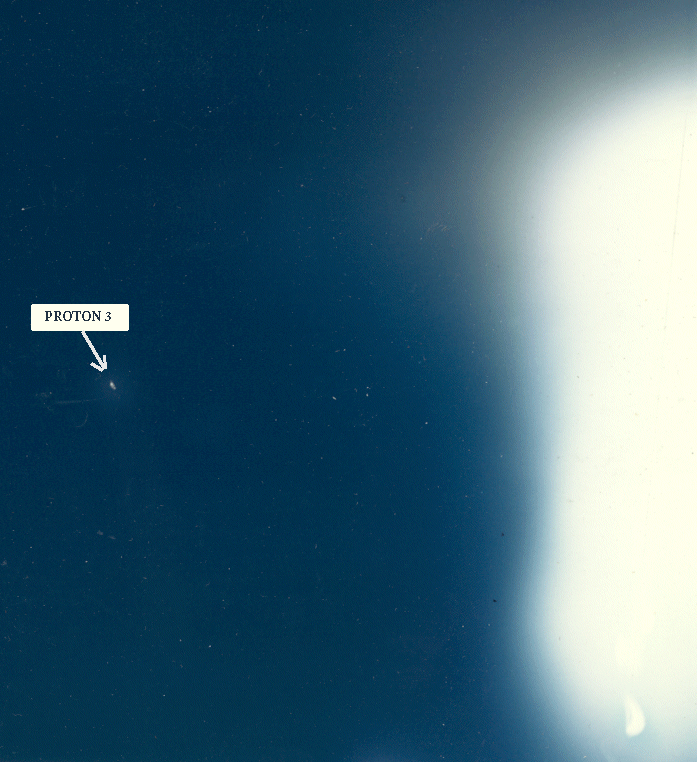
Last week, NASA released perhaps the most extraordinary example of this nature: the first snapshot of a spacecraft sent to the Moon…by a spacecraft sent to the Moon! Lunar Orbiter 3, launched early last month, has been busily mapping our celestial neighbor, searching for the choicest landing spots for Apollo (whose first manned mission, I've just learned, has been delayed until next year due to the Apollo 1 fire.) In the course of its surveying, Lunar Orbiter 3 caught a glimpse of Surveyor 1, the first American soft-lander. It all makes the Moon feel that much closer.
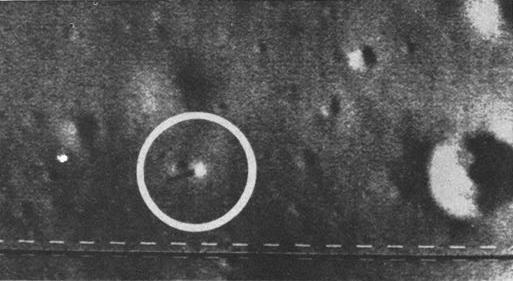
While the newspaper brings us tales of science fiction-made-fact, the stf mags continue to provide the visions of science-to-be. The latest edition of The Magazine of Fantasy and Science Fiction offers several visions of the future: some poetic, some bleak, and some not really worth reading. Good thing I'm here to tell you which is which, huh?
A pail of tomorrows
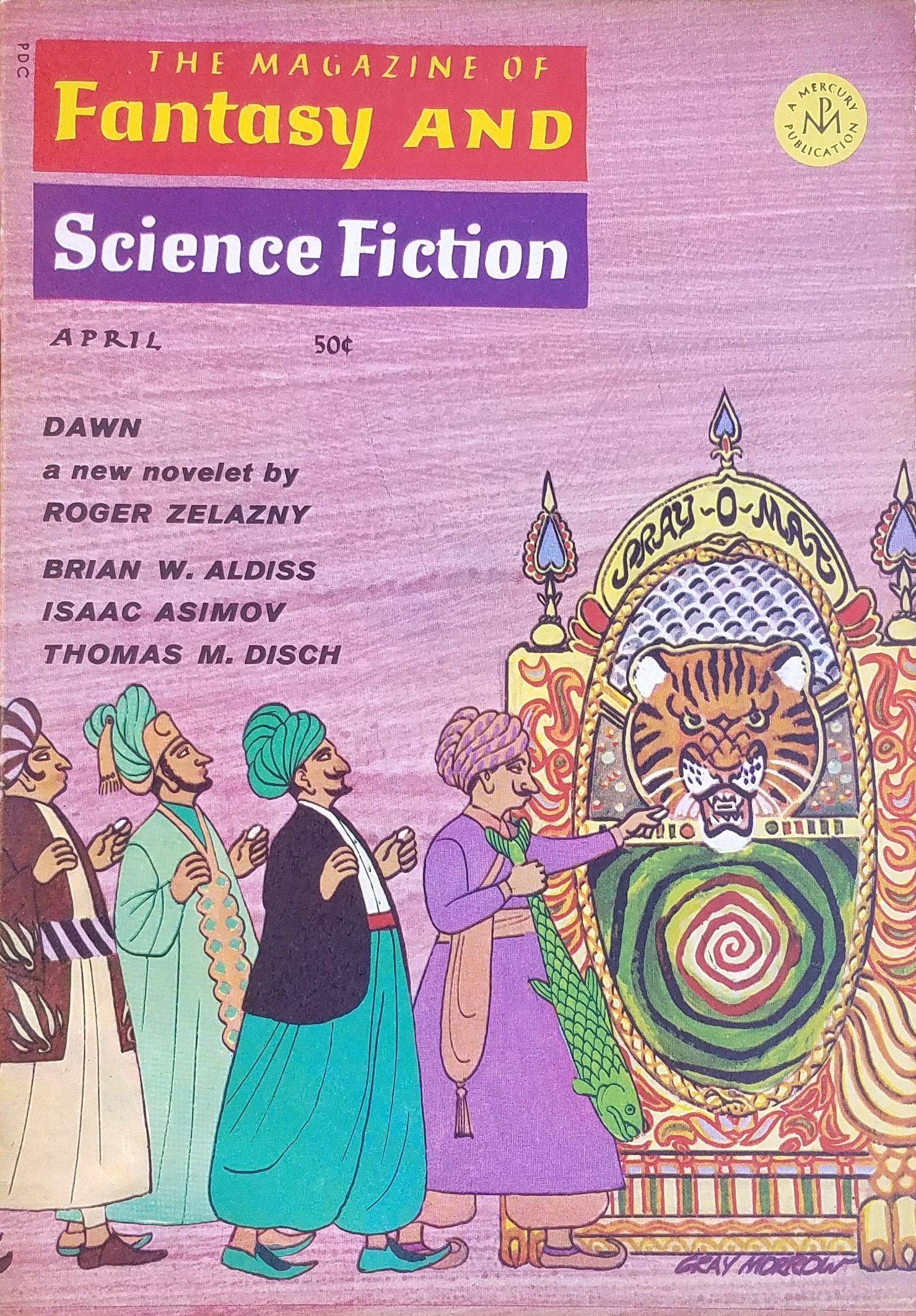
by Gray Morrow
Dawn, by Roger Zelazny
Lord Siddhartha, the Buddha, arrives as the capital for a bit of revelry. There, he is greeted with honors, for he is a prince of this land, redolent with the smells of spice, the bustle of medieval commerce, the prayers of the devoted. At first glance, Dawn seems as if it will be a pure fantasy in a richly drawn world. But there are signs that underneath the veneer of ancient India lies a strictly scientific core.
Indeed, we learn quite soon that Siddhartha is actually Sam, one of the original colonists on this world, a planet whose technology has been deliberately restrained by the cabal of the Firsts and their lackeys, the Masters. Their firm grip lies in their stranglehold on immortality, facilitated by their ability to transmigrate souls from body to body at will.
Sam wants to bring progress to the world. Can he and his band of rebels undo the work of centuries?
Zelazny's latest novella is reportedly the first part of a longer work, to be titled "Lord of Light". If it is as expertly rendered as this fine start, then it'll be a good read, indeed!
Four stars.
The Two Lives of Ben Coulter, by Larry Eisenberg
"The greatest disappointment of Ben Coulter's life was his inability to play the violin well."
So begins the tale of a fellow who turned instead to engineering for the purpose, failing to find it there until he co-developed a technique for the remote control of a living being. Perhaps, at last, he could program mastery into himself.
Most science fiction authors take inspiration from the science news of the day. Some, like Doc Smith, are actually scientists. Larry Eisenberg is perhaps unique in the SF community for extrapolating a scientifiction application of his own invention, the remote controlled pacemaker.
His story, if not quite as personally affecting as his crowning scientific achievement, is a pleasant little piece, nonetheless.
Three stars.
Cloud Seeding, by Theodore L. Thomas
In this fictionless vignette, Thomas suggests combining cloud seeding with chemical distribution. After all, if you're putting stuff in the sky to make rain, why not use fertilizer or poison of what have you.
Thomas forgets that the seeds for the raindrops are necessarily uselessly tiny. I almost feel as though these little exercises are not to present interesting ideas, but are puzzles for the reader: spot the fallacy and win a hundred dollars!
Two stars.
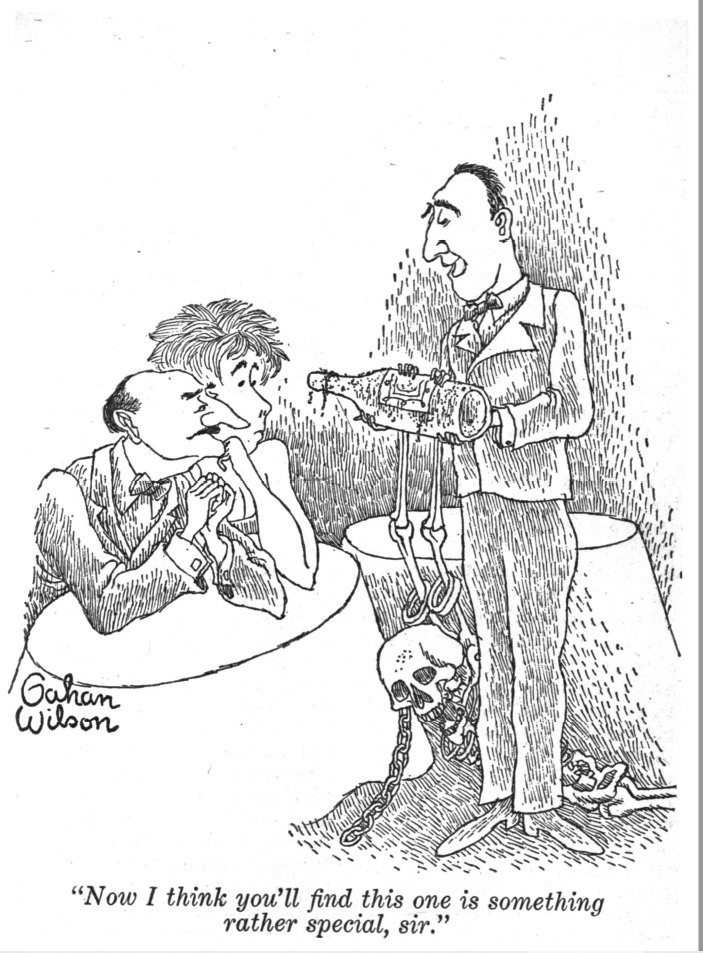
by Gahan Wilson
Problems of Creativeness, by Thomas M. Disch
The 21st Century is an overcrowded, socialist paradise. Everyone is on the childless dole, unless they can prove themselves exceptional, finish college, or join the guerrila forces. Birdie Ludd, the least exceptional of young men, doesn't want to do any of these things. But for the love of Milly, pretty enough almost to be a movie star, he was willing to endure almost anything.
Less a story and more a slice-of-life from the perspective of an indolent youth, Problems relies mostly on a vivid stream-of-consciousness style and copious use of the first profanity I've read within F&SF's pages.
Three stars, I guess.
The Sword of Pell the Idiot, by Julian F. Grow
Farquhar Orpington-Pell, late a subaltern in Her Majesty's Own Midlothian Dragoons, falls in with a Western doctor on the late 19th Century range. Their crooked path takes them to a subterranean complex inhabited by aliens. Things Happen. Supposed-to-be-funny-but-just-tedious things, capped off by the rather insulting punchline that the transpirings inspired a much better, well known set of books.
Feh. One star.
"Virtue. 'Tis A Fugue!", by Patrick Meadows
An advanced world refuses the entreaties of humanity to join a terran federation. Professor Thomas Gunn, a musicologist, provides the key to reaching the hearts of the aliens. Their language is the culmination of tonality, you see, each sentence its own song. Our hyper-efficient, sound-codified speak was too declassé to appeal.
It's all a lot of "mun, mun" to me, and in any event, the revelation came out of nowhere. Indeed, Gunn's story and that of the contact team are completely unrelated until he suddenly appears on the planet in the story's last scenes.
Two stars.
A Matter of Scale, by Isaac Asimov
The Good Doctor goes way out with his latest article. You know those "the sun is a beachball, and the planets are various small fruit several hundred feet away" models you read in all the science books for kids? He's decided to go one better, substituting atomic analogs so the distances can be more relatable.
I'm sure it was a fun exercise for him.
Three stars.
Randy's Syndrome, by Brian W. Aldiss
Lastly, another tale of the next, shoulder-to-shoulder, anti-utopian 21st Century. The foetuses of the world go on strike, refusing to be born into such an awful place. But is it really a mass strike of the unborn, happy in their womb world of racial memory and distorted, second-hand sensory inputs? Or is it some kind of planetary neurosis of the mothers?
Whatever it is, it's not science fiction, more a modern myth. Some might find it clever.
Two stars.
Under the Moon
After such a bright beginning, the April 1967 F&SF stumbles to a finish. I recognize that science fiction is cautionary as well as aspirational, but I feel one needs to say more than "this future we're heading toward is gonna stink..and by the way, the future is now."
The Zelazny is worth your time, however.
And, hey, at least the newspaper brings us pretty pictures!
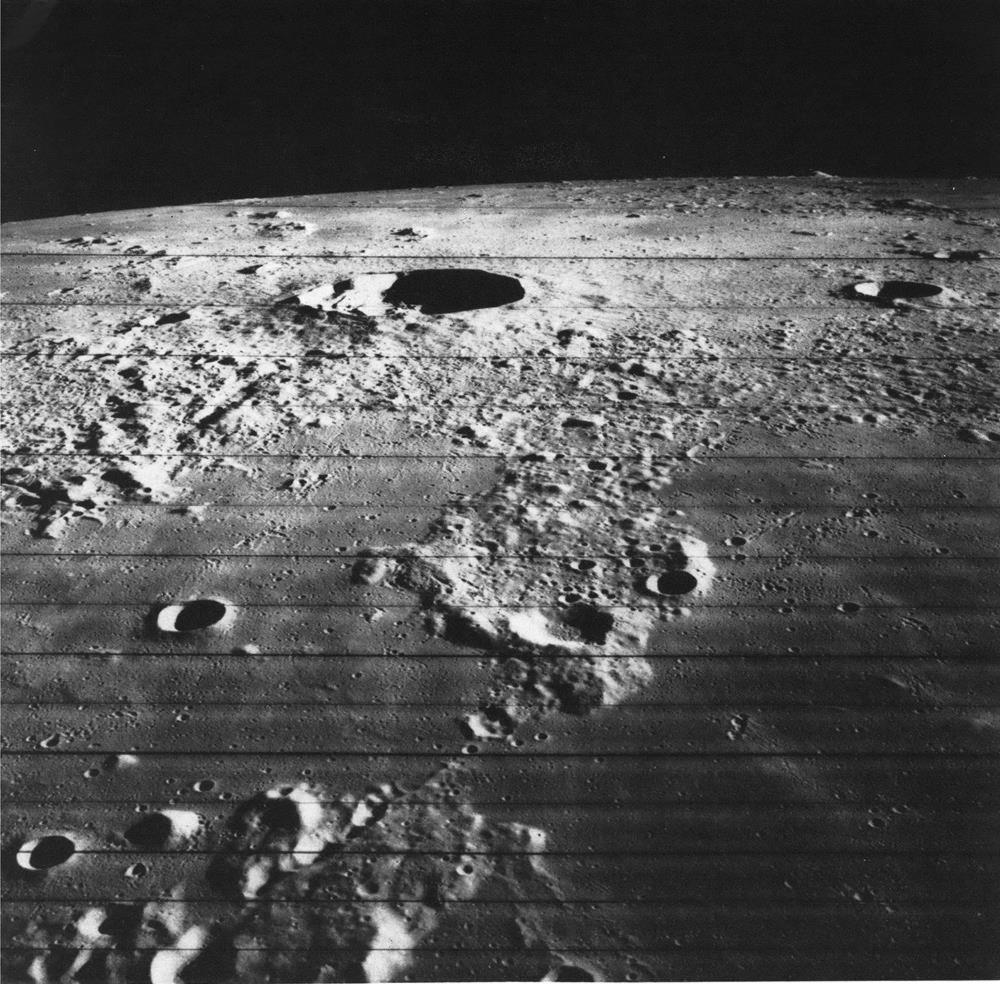



I wasn't sure if you'd like the Zelazny, but I guess this is closer in tone to "And Call Me Conrad…" than some of his more deliberately literary pieces. In any case, I'm looking forward to the promised next excerpt from the novel and the novel itself.
"Ben Coulter" was all right, but nothing special. There probably aren't too many science fiction writers who could write about their inventions. Murray Leinster, maybe. I certainly wouldn't want to read a Doc Smith novel about cake mix.
For me, the biggest problem with Ted Thomas' idea this month isn't the tiny size of the grains raindrops form around. It's that rain doesn't fall in neat squares and rectangles exactly over farmers' fields. All that fertilizer and weed or bug killer is going to wind up in drainage ditches, creeks, rivers, ponds and ultimately drinking water. Rachel Carson showed us what a too liberal application of DDT was doing. Imagine the consequences of what Thomas is proposing!
"Three stars, I guess," is just the right score for the Disch. I am getting rather tired of all these stories complaining about what kids these days are or aren't learning.
"Pell the Idiot" was pretty bad, though I might give it 2 stars as a parody of that sort of story. On the other hand, when you can describe the series of books it supposedly inspired as "much better" it tells you a lot about Grow's effort.
I sort of enjoyed "Fugue", but I'm not entirely sure it's worthy of three stars either.
I continue to just not like Brian Aldiss' work. I managed to turn the corner on Algis Budrys, but Aldiss just eludes me.
General agreement, with one exception. The Zelazny is indeed excellent, but I also loved "Problems of Creativeness." Besides creating an all-too-believable portrait of the near future, Disch does something rather extraordinary. He has to write what is clearly a bad essay in the voice of someone who is doing his best, and who thinks he's writing a good essay. (Even the title of the story/essay hints at this, since it sounds pretentious, but "creativeness" is just an awkward way of saying "creativity.")
I agree with Victoria about "Problems of Creativeness" … it's an excellent story, and Birdie's voice is beautifully captured.
As with the Zelazny, I wouldn't be surprised to see it turn up as part of a novel!
Strong agreement with Victoria Silverwolf. I liked the Zelazny (I like or love almost all Zelazny stories), but Disch's "Problems of Creativeness" was the standout story for me this month.
Me three on Disch's "Problems of Creativeness," a brilliant dystopian piece about a society not too far ahead where the only place for the not too bright or capable is as cannon fodder (not too far-fetched a point as we can see looking around at the US of A in this year of massive military build-up).
Dawn is definitely good Zelazny. So far I am particularly impressed that he seems to have bothered to research and be sensitive with Hindu and Buddhist beliefs, rather than the usual terrible treatment in SF of non-Western belief systems.
Eisenberg has never been an author whose work has much impressed me. But given the fact that he manages to sell to the mainstream magazines and got two of his stories picked up for the latest season of Out of the Unknown, others clearly like him. This didn't really change my mind, felt over descriptive and too old-fashioned for my tastes.
I think I come down with those more positive about Disch. It is definitely an interesting literary experiment. It isn't particularly easy to read as a result but I think worthwhile pushing through.
I must have read Julian F. Grow before but the contents of his previous stories escape me. I am guessing because they were of this quality. Really bad with a truly awful ending.
Meadows's short was fine but I kept feeling like I was missing something. Possibly I was distracted wondering if the Floyd he referred to was meant to be London's The Pink Floyd? If so he is very up to date on his music.
And finally Aldiss' piece. I wouldn't so much call it a modern myth, as much as a light satire. Something that wouldn't be out of place in a Wednesday Play or a mainstream publication (except maybe the ending). I enjoyed it. I don't think it was one of his best.
I am wondering with both the Aldiss and the Disch if these were originally designed to be sold to the British markets, but with the current troubles in the magazines over here, the authors needed to seek out other markets. If so their loss was our gain.
Overall a stronger issue than we have seen in a while.
The unusual and attractive F&SF cover art prompts the thought that some enterprising publisher might think about launching a paperback series of fantasy reprints. After all, Tolkien has been a great success. From the Victorian period, what about reprinting George Meredith's The Shaving of Shagpat?